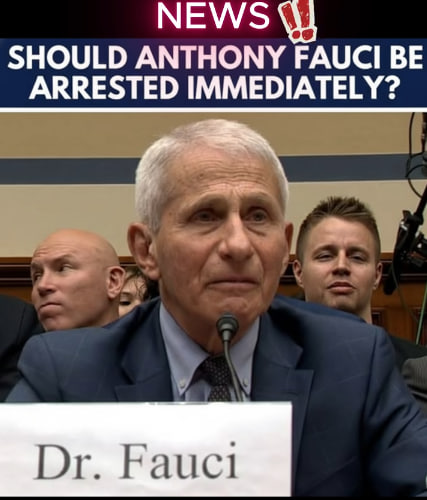A Familiar Face in a New Controversy
Dr. Anthony Fauci, the longtime director of the National Institute of Allergy and Infectious Diseases and one of the most visible figures during the COVID-19 pandemic, has once again found himself at the center of political debate.
A recent wave of online posts and political commentary has reignited discussion over whether Fauci should face legal accountability for decisions made during the pandemic response.
The calls for investigation come amid renewed scrutiny of the origins of COVID-19, government transparency during the crisis, and broader distrust in public health institutions.

The Claims and the Context
Critics argue that certain actions taken by federal health agencies under Fauci’s leadership may have overstepped public authority, particularly regarding lockdowns, vaccine mandates, and funding of virus research abroad.
Some Republican lawmakers have pushed for hearings to examine whether public health policies were influenced by incomplete data or conflicting interests.
However, no formal charges or criminal investigations have been announced. Multiple bipartisan reviews have concluded that while mistakes were made during the crisis, there is no verified evidence of criminal intent or misconduct by Fauci himself.
Supporters Defend Fauci’s Record
Supporters describe Fauci as a career scientist who guided the nation through one of its most complex health emergencies.
They point to his decades of service under seven presidents and his role in combating HIV/AIDS, Ebola, and Zika outbreaks.
“He worked with the information available at the time,” said Dr. Lena Morales, a public health policy expert. “Science evolves, and so do recommendations. That’s not deception — that’s how science works.”
Public opinion remains divided. While some Americans credit Fauci with saving lives through early mitigation measures and vaccine support, others believe the government’s response caused lasting economic and social harm.
Political Repercussions in Washington
The debate has now extended into the halls of Congress.
Several House committees, led by Republican members, have requested additional documents from the National Institutes of Health (NIH) related to pandemic decision-making and communications with foreign laboratories.
Democrats have largely dismissed these efforts as politically motivated, arguing that re-examining pandemic-era decisions should focus on improving future responses, not targeting individuals.
Meanwhile, political analysts note that Fauci has become a symbolic figure — representing, to some, the integrity of science and, to others, the dangers of unchecked government authority.
Fact-Checking and Legal Reality
Despite headlines and viral posts suggesting imminent arrest or prosecution, legal experts emphasize that there is currently no open criminal case against Dr. Fauci.
Under federal law, prosecution would require clear evidence of willful misconduct, falsification of data, or obstruction — none of which have been established by any investigative body.
“The rhetoric online doesn’t match the reality of the legal process,” said constitutional lawyer Daniel Reeve. “Criticism of policy decisions is legitimate. But conflating that with criminal behavior is misleading.”
Major fact-checking organizations, including Reuters and AP, have repeatedly clarified that while Fauci remains a polarizing figure, no verified legal proceedings are underway.
A Broader Reflection on Trust and Accountability
Beyond Dr. Fauci himself, this debate reflects a deeper national struggle over public trust.
Americans are still divided over how much power government health officials should have in times of crisis, and how transparent scientific institutions must be when shaping national policy.
As one bipartisan report from the Senate noted, “The COVID-19 era revealed not only weaknesses in public health systems but also fractures in civic confidence. Restoring trust is essential before the next emergency.”
The Road Ahead
Dr. Fauci retired from government service in late 2022 but continues to speak publicly about lessons learned from the pandemic.
He has consistently denied any wrongdoing and maintains that his focus has always been to protect public health based on the best available science.
Whether investigations continue or fade, the conversation around accountability, transparency, and preparedness is far from over.
For now, the question that divides Washington — and much of America — is not just about one man, but about how the nation balances leadership and responsibility in the face of crisis.